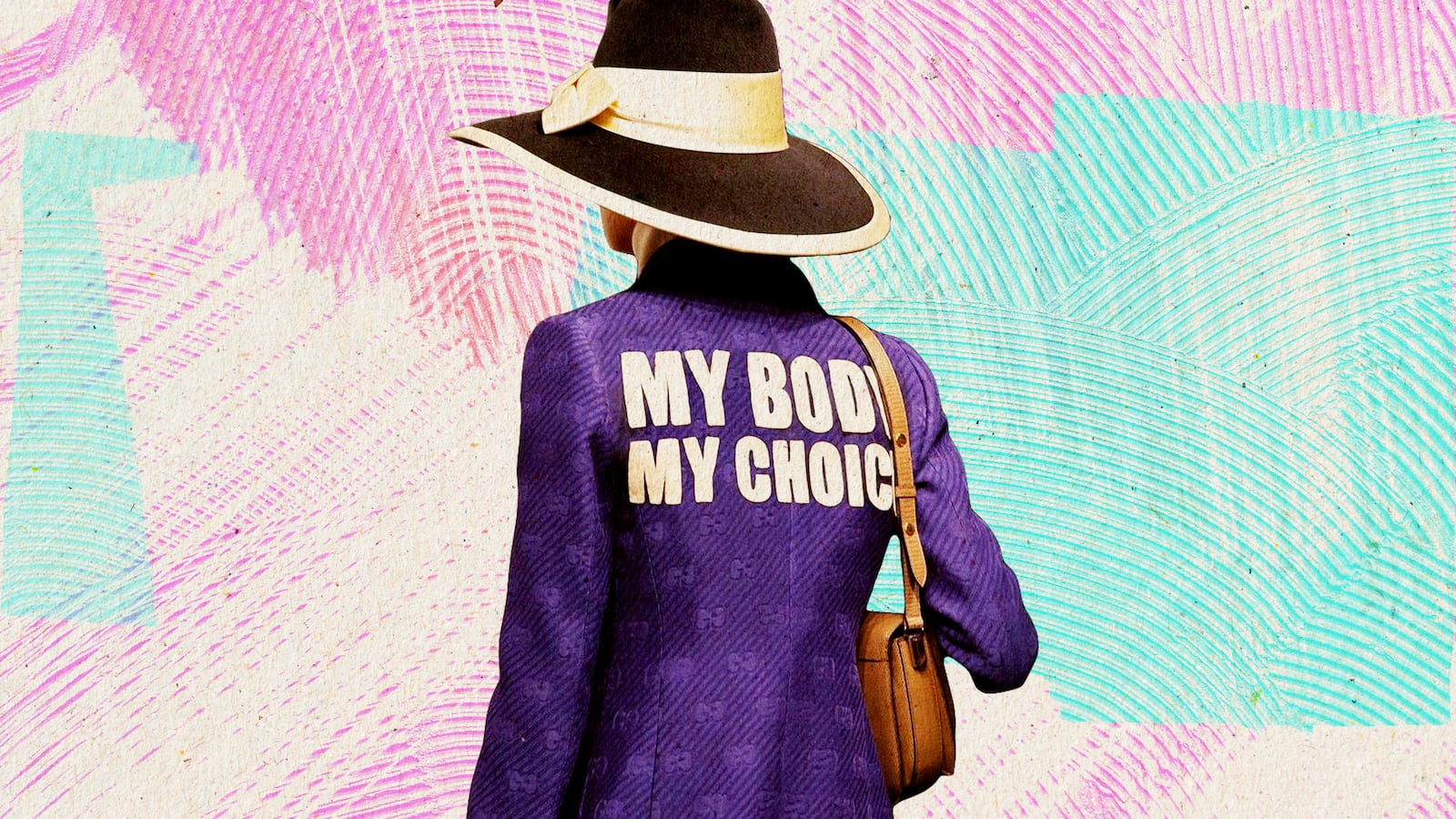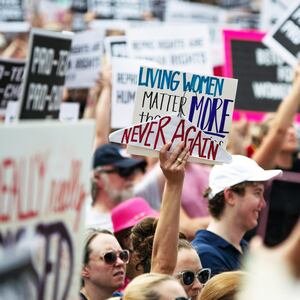It was the Supreme Court leak heard around the world. SCOTUS looks likely poised to overturn Roe v. Wade, the landmark 1973 decision that protects a woman’s right to access abortion care. The revoking of Roe is what the anti-abortion movement has been working toward for decades, and it is what reproductive rights advocates feared when Amy Coney Barrett replaced Ruth Bader Ginsburg upon her death.
The fashion industry wasted no time responding to the potential overturning of Roe v. Wade, leaving women in most states without any rights to abortion access and care.
Gucci, a company based outside the U.S., was one of the first major corporations to respond to the potential end of Roe. The company recently announced it will provide travel reimbursement to any U.S. employee who needs access to health care not available in their home state.
Levi Strauss & Co., one of America’s most famous denim brands, issued a statement after the leak, stating a woman’s access to reproductive health care has been a “critical factor to the workplace gains and contributions women have made over the past 50 years.” Levi’s already allows reimbursements for health care-related travel expenses, but it has called on fellow business leaders to protect reproductive rights.
In a statement e-mailed to The Daily Beast, H&M said, “While we are of course monitoring the situation, we continue to support access to legal and safe reproductive health care.”
Uniqlo declined The Daily Beast’s request for comment.
Gap, Forever 21, Esprit, Primark, Zara, Chanel, Prada, Dior, Burberry, Fendi, Michael Kors, Marc Jacobs, Ralph Lauren, Christian Louboutin, and Valentino did not immediately reply to The Daily Beast’s request for comment.
Companies including Patagonia, M.M.La Fleur, TheRealReal, Goop, Eileen Fisher, Mara Hoffman, Lululemon, The Body Shop, Stitch Fix, Glossier, and Madewell have signed on to the Don’t Ban Equality Pledge relaunching on June 6 in support of reproductive rights. A statement on the website reads: “Restricting access to comprehensive reproductive care, including abortion, threatens the health, independence, and economic stability of our workers and customers. When everyone is empowered to succeed, our companies, our communities, and our economy are better for it.”
Earlier this year, Planned Parenthood also called on the Council of Fashion Designers of America (CFDA) and its member designers to take a stand for #BANSOFFOURBODIES to show support for reproductive rights during New York Fashion Week and beyond throughout the year.
No formal approach to raising funds for reproductive rights between Planned Parenthood and the CFDA has yet happened. However, in 2017, the two organizations teamed up for Fashion Stand with Planned Parenthood to raise awareness and funds for Planned Parenthood. The CFDA did not return a request for comment on where it stood on Roe.
Currently, smaller fashion brands are stealing the march on the larger ones. Jewelry brand Zoe Chicco’s collaboration with Justina Blakeney will see all proceeds go toward the American Civil Liberties Union.
Jenna Kerner, co-founder and CEO of bra company Harper Wilde, is very proud of the brand’s “F*** Your Laws Collection.” The black bra from the collection is currently on sale right now, with 15 percent of proceeds going toward The Roe Fund. The bra was originally released in 2019 when several states were on crusades to restrict abortion access.
“We were already planning to release more ‘F*** Your Laws’ products, and unfortunately the timing now lands as the SCOTUS leak overturning Roe v. Wade was announced,” Kerner said. “We’re in a time where human rights and women’s rights are under attack. Harper Wilde wanted to take a stand for what’s right and hope to raise money for a cause to make a difference where we can.”
While Kerner doesn’t feel it’s the responsibility of the fashion industry to tackle reproductive rights, she said, “For any industry and any brand, if you have the opportunity to have a voice and bring awareness to topics to collectively help people, it’s beneficial to make people a little more aware of issues and organizations tackling these issues.”
Although Kerner acknowledges some brands are performative about their stance on these issues, she said, “There’s always going to be companies that are more authentic about their views and those who aren’t. Those who aren’t authentic are doing it for the wrong reasons, but at the end of the day the goal is awareness.
“For brands who aren’t being authentic about their views, that will hurt them in the long run once people catch on. Consumers are way more informed and educated nowadays, and they will hold brands accountable. There’s the argument made that if all brands are standing or something, even if some are more performative than others, it’s still bringing awareness to issues, good or bad, but people are talking.”
Sylvia Ghazarian, executive director of Women's Rights Reproductive Assistance Project (WRRAP), has seen many donations to her organization come through independent fashion brands, including vintage shop Lenny and independent brand Yung Reaper.
In 2021, the organization paid out $538,301 to assist 2565 patients with access to reproductive health. Eighty-three percent of these women are unmarried, 73 percent are BIPOC, and 74 percent were already parents with one or more children. They partner with clinics in all 50 states and Washington, D.C., to provide women with access to reproductive health care and alleviate the economic barriers to access.
Ghazarian said, “Fashion is continuing to support reproductive justice as an important aspect of diversity, equity, and inclusion. Being able to merge the elements of diversity and utilizing that in the fashion industry to represent the reproductive justice movement is vital. We need to continue down this path with more companies supporting reproductive justice, especially now. Reproductive rights are about attaining safe and affordable access to health care.”
She added, “The fashion industry can hit a huge audience of individuals. We are seeing fashion pieces with the word ‘abortion’ on them. Influential designers are making statements in support of fashion and reproductive justice. The influence is there, but there needs to be a wider audience of fashion designers and employees who stand strong on their views of how important this issue is.”
Ghazarian also said if fashion companies are serious about reproductive justice, they need to support their employees. Health care plans jobs offer need to support their employees and their reproductive needs. Companies also need to set up travel accounts for employees who may not have health care options for their reproductive needs within their own states due to restrictive laws or meager options.
While Ghazarian believes companies sometimes hop on the bandwagon when political issues like reproductive rights are popular, she said, “It’s also important when you pledge to take a stand that you also commit to supporting organizations that do this work. We need those dollars because reproductive health care doesn’t wait. We have a backlog at our partner clinics from patients who must travel to get health care. We need that financial support to assist individuals with higher levels of giving.”
If Roe v. Wade is truly struck down, organizations like WRRAP have been building for this moment to still give women access to reproductive health care. They are also ahead of the game with a program established to provide abortion pills by mail through health care providers.
Some brands might worry that being a vocal abortion rights advocate can alienate customers, but designers like Heather Briganti, president of L.A.-based brand Yung Reaper, see their commitment to the issue as more important.
“I don’t worry about that,” Briganti said. “Yung Reaper has always been transparent with our clients on where we stand on reproductive rights. Our relationship with our customers is very personal, and they know who we are and what we believe. I can understand while other brands might have those reservations, but not us.”
She believes fashion is a great medium for addressing reproductive rights issues because “Fashion and social media are one. Whether we know it or not, we consume fashion every day. Fashion is everywhere.”
Briganti acknowledges that it’s not obvious when brands are hopping on a bandwagon when it comes to these issues to keep themselves relevant, and it does happen. However, “If they are, who cares,” she said. “As long as they get the message across, but they are raising money for pro-choice causes, it’s great. Either way, if they are saying something in support of reproductive rights, that’s going to reach someone, and it could save someone’s life.”
Currently, Yung Reaper’s “F SCOTUS” collection sees 20 percent of proceeds go toward WRRAP. For an industry, like fashion, built on the labor of women, some feel it has an obligation to speak up about reproductive rights.
Lindsey Davidson, founder and CEO of L.A.-based vintage shop LENNY, said, “The fashion industry was built on the shoulders of women’s labor, and reproductive rights are a basic human necessity for women. Without access to reproductive health, many people who help sustain the fashion industry would be left incapable to function. It’s our job and duty as community builders with a platform to speak up.”
While it might be easy to just make an Instagram post in support of reproductive rights, many fashion brands appear to be putting their money where their mouth is. As the threat of Roe v. Wade being overturned looms, the donations and advocacy from the fashion industry to keep reproductive rights in place are there.
Immediately after hearing about the SCOTUS leak and the likelihood of overturning Roe, Davidson partnered with WRRAP donating 15 percent of LENNY’s net sales for May to the organization.
As a vintage shop, Davidson attracts a wide range of consumers, but that doesn’t deter her from being vocal about reproductive rights. “Companies who concern themselves with alienating consumers for supporting reproductive rights need to think clearer about who they are targeting,” Davidson said. “If your end goal as a company is to just sell things and you’re not concerned with building a brand ethos and standing for something, I don’t think that's the right mentality to have.”
Davidson also shares similar sentiments to Briganti over companies’ bandwagoning regarding reproductive justice. “It’s not for me to judge if brands are being performative about supporting these issues, but if people are talking about it and bringing awareness, we all need to work together. We need to work to help raise money and awareness for those who need access to reproductive health care because there are people lacking access in dire need of it.”







